It took Angel Diaz 34 minutes to die — 34 excruciatingly painful minutes of waiting for the chemicals flowing into his body through the IV tubes in both arms to kill him. According to witnesses, his eyes widened, his head rolled, he continued to speak, and his body continued to move limply for 24 minutes. His Adam’s apple bounced up and down continually and his jaw was clenched.
Diaz was executed in Florida on Dec.13, 2007 for murdering the manager of a topless bar. After his body was removed, it was clear that Diaz’s execution was botched.
Even though this case holds no real value to residents of California, it is clear that the death penalty has become a barbaric form of punishment.
Recently, the California Commission on the Fair Administration of Justice (CFAJ) examined the state’s death penalty in an effort to identify inconsistencies in its application and reforms for improving the system.
There are two common arguments in support of capital punishment: avoidance of the actual problem and revenge.
Should the death penalty be abolished in California? I say no, but what I do think, is that the death penalty hasn’t stopped crime.
There are many reasons why capital punishment is deeply flawed: it costs tax payers more to execute someone than to keep them in prison for life, it violates the 8th Amendment, the possibility of putting an innocent man or woman to death is high, and life in prison is a worse punishment and more effective, and killing the perpetrator doesn’t bring the victim back to life.
Does the death penalty put an end to violence and criminal behavior? Is it possible a potential murderer considers the possibility that he or she might be convicted of a crime and face the death penalty? It’s highly unlikely.
According to www.balancedpolitics.org, carrying out one death sentence costs two to five times more than keeping a criminal in prison for life. It’s due to countless appeals and legal wrangling that keeps the process dragging, yet we still insist on wasting our hard earned money on this process.
Saddam Hussein and Kim Jong-il are people who we condemn for murdering their own people, while we continue to do the same.
The 8th Amendment of the U.S. Constitution prevents the use of “cruel and unusual punishment”. Some would say the death penalty violates this restriction.
What is even more disturbing is the possibility of innocent men and women being put to death.
There are several documented cases where DNA testing showed an innocent man or woman was put to death by the government. It comes down to economics; a poor defendant is given inadequate legal attention by not-so qualified legal representation. These mistakes cannot be afforded.
It’s understandable that little sympathy is given to a murderer, but what we need to grasp is when someone is given a death sentence the pain suffered is over in an instant. With life in prison, the pain goes on forever. It forces the prisoner to examine the crime they committed everyday, whether it is rape or violence; internally the person has to live in that environment.
The death penalty is useless. The death penalty doesn’t change the fact that the victim is gone and won’t return to the living. Hate, revenge, and anger isn’t the cure to the pain of losing a loved one. It all starts with forgiveness; there the healing process can begin.
In the end, we as a society have to move away from the “eye for an eye” revenge mentality if we want to advance as a civilization. The “eye for an eye” frame of thinking will never solve anything. If we keep thinking revenge is the solution to teaching murders and rapists a lesson, then all we have is a vicious cycle of continued violence.
Let your burden of hate, anger, and revenge be on the murderers and rapists of the world.
It’s like what Mahatma Gandhi once said, “The weak can never forgive. Forgiveness is the attribute of the strong”.



